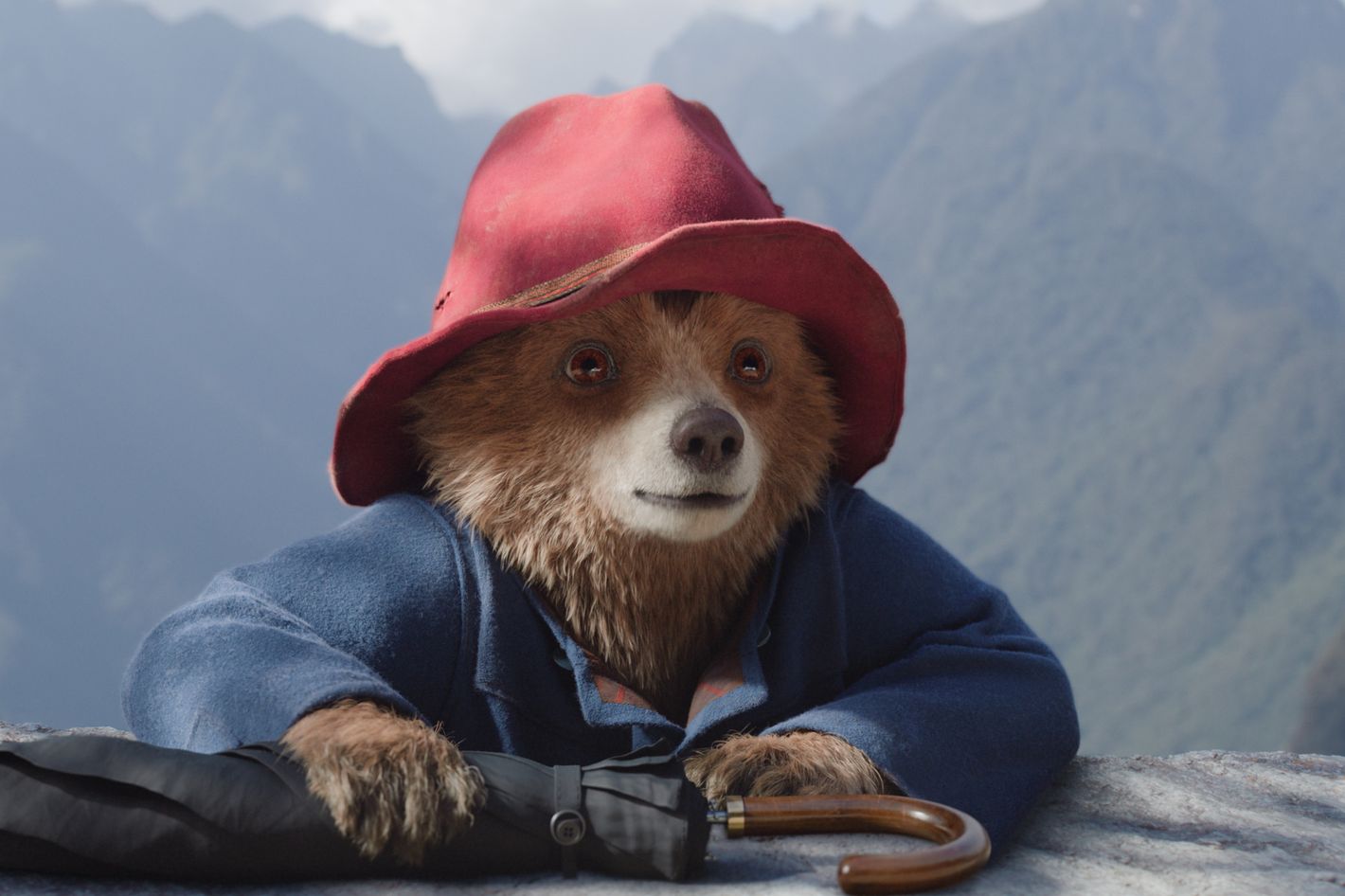Paddington in Peru Bites Off More Than It Can Chew
Fortunately, adorable talking bears have big appetites.


From the beginning, the Paddington movies have linked their fictional bear, the creation of children’s book author Michael Bond, to themes of migration and sanctuary. This didn’t come out of nowhere. While Paddington Bear is emblematic of Britishness, from his love of marmalade to his duffel coat to his unfailing politeness, he came from South America — more specifically, “darkest Peru,” an origin story that smacks of a colonial era where whole swaths of the world could be consigned to gloom on a map based on their impenetrability to foreign explorers. For the cynical, and I’m usually one of your number, the turning of this beloved icon into a symbol of a welcoming, multicultural U.K. could be read as a way of lightly outrage-proofing a property that’s half a century old and unavoidably musty in patches. And yet, miraculously, what could have been clunky and self-congratulatory was delicate and moving, helped along by the gentleness with which Ben Whishaw voices the computer-animated ursine. Paddington’s arrival on that train platform as a refugee, and his adoption by the Brown family, is placed in a tradition of the country taking care of those in need going back to World War II and the Kindertransport. The Wes Anderson–inflected London of that 2014 first film was a retort to sentiments that would, two years later, lead to the Brexit referendum, but it was also stubbornly aspirational — a fairy-tale version of the city as it could be, open arms and all.
In Paddington in Peru, Paddington has officially become a Brit, having received his passport in the mail. This frees him up to take a trip home, a prospect as low-key worrisome as the fact that the film, the third in the series, is also the first to not be written or directed by Paul King. The whimsical but wry perspective on Britishness that made the first two Paddingtons so watchable threatens to be intolerable when turned outward, like someone going from in-jokes to insult comedy. Paddington in Peru reckons with this possibility by putting very few Peruvians onscreen, even when the movie ventures into the Amazon, spurred by the mysterious disappearance of Paddington’s beloved Aunt Lucy from the Home for Retired Bears. Instead, it keeps its focus on the Browns, now headed up by Emily Mortimer, who replaces Sally Hawkins as matriarch Mary, as they accompany Paddington on a vacation-cum-rescue-expedition involving the legend of El Dorado, a bunch of nuns, and Hunter Cabot (Antonio Banderas), a riverboat captain who turns out to be descendant from a long line of rapacious Spanish gold-seekers. Hunter’s obsession, which manifests in comical visions of his taunting conquistador ancestor, isn’t an especially sharp critique of the colonial legacy the whole swashbuckling adventure owes a debt to. But Paddington in Peru doesn’t feel like it’s aiming for a point so much as it’s just trying to steer clear of potential disaster.
And, even if it’s the weakest of the Paddington movies, it succeeds. The innate sweetness of the series carries it past figurative and literal rapids and into shenanigans involving bear carvings, a bear temple in the mountains, and a secret bear community. (Hunter, exasperated, complains at one point about how “beary” the whole situation is.) While Banderas is entertaining playing multiple roles as Hunter and his many ghostly ancestors, Olivia Colman gives the movie’s standout performance as the Reverend Mother of the bear retirement home from which Aunt Lucy vanished. Colman keeps her face frozen in an expression of maniacal cheerfulness, the hilarious effect of which really can’t be overstated. When the Reverend Mother bursts into song at news of Paddington’s imminent arrival, singing to the camera while nuns dance behind her, it’s like The Sound of Music as enacted by a serial killer, up to and including Colman throwing her guitar into the air in defiance of gravity, like Prince at the Super Bowl. These films have featured terrific comic performances from the likes of Nicole Kidman and Hugh Grant, but Colman brings an unhinged energy to her part that elevates the whole enterprise. (“It’s just a secret room behind an organ,” she chipperly informs Mrs. Bird, played by Julie Walters, insisting to the Browns’ housekeeper there’s nothing at all suspicious about the mysterious hidden space she discovers in the retirement home.)
Obscured by the wilderness and religious-order exploits are Paddington’s own emotions about being back in the place of his birth after adapting to life an ocean away. Mr. Gruber (Jim Broadbent), the antiques store owner, warns the bear that “becoming a citizen of a country, while a wonderful thing, can lead to mixed feelings.” But if Paddington does feel conflicted over where he belongs, or over having lost touch with his family’s beary roots, it’s never explored. The wonderful surprise of the Paddington films is that they’ve been able to deftly touch on some difficult themes by way of adorable children’s stories, all without overplaying their hand. Paddington in Peru suggests that some things are beyond the franchise, no matter how winning its good-hearted animal hero may be, and one of them is considering what it might be like to not whole-heartedly love life in the U.K. after the U.K. has proven itself willing to love you.








